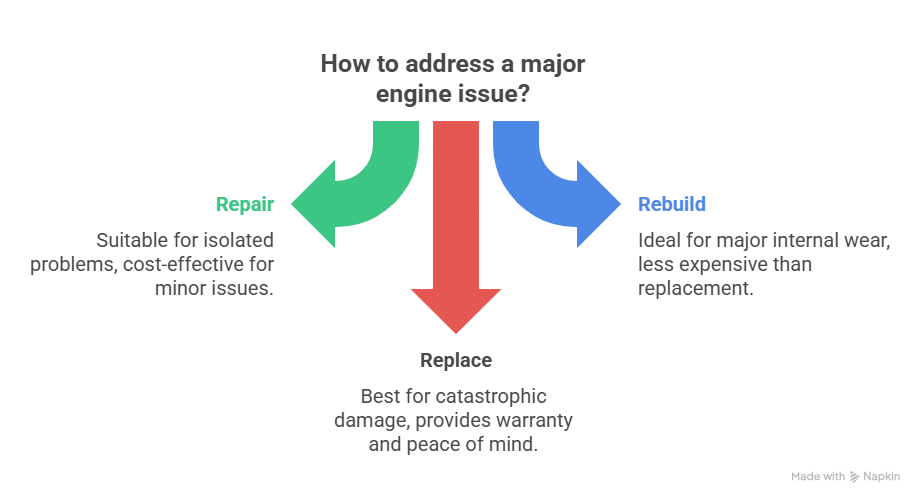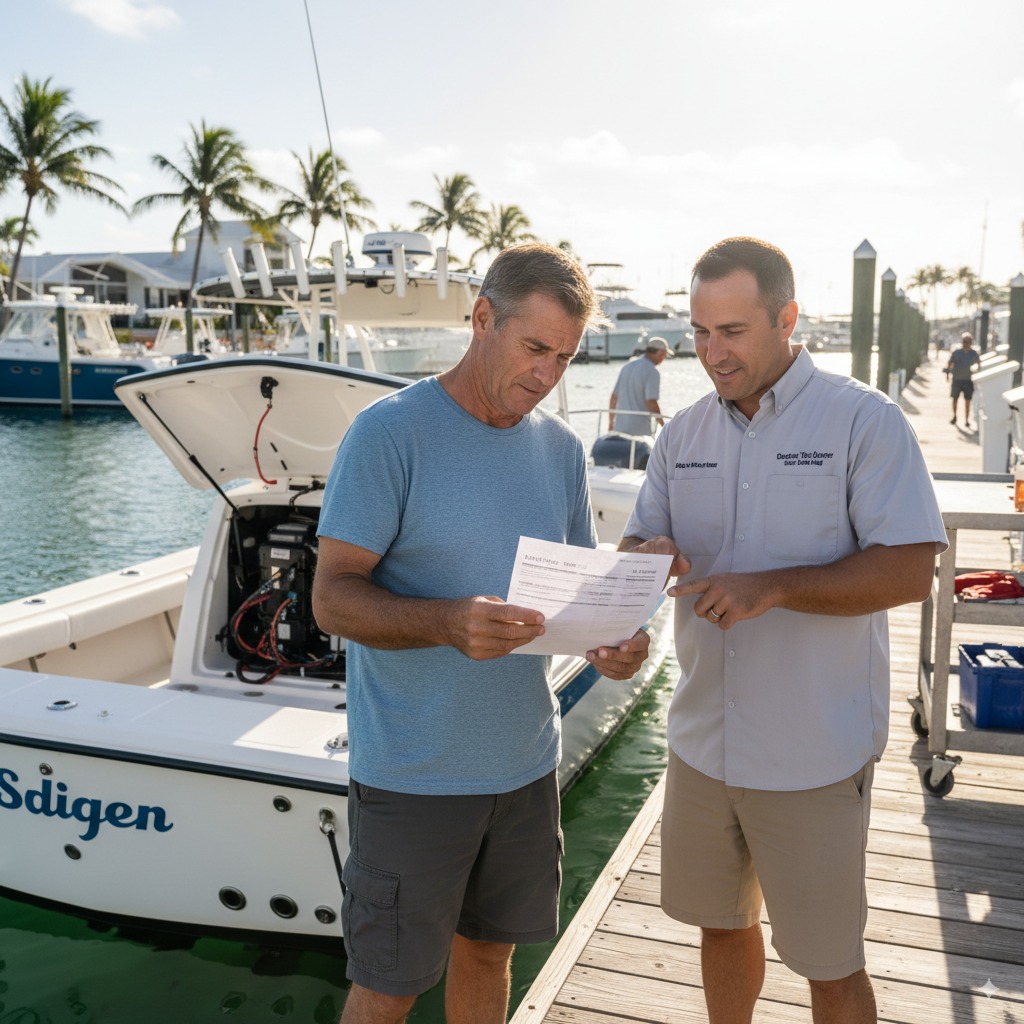I’ve been a marine mechanic in South Florida for 15 years, and if there’s one question I hear more than any other, it’s this: “How much do marine mechanics charge per hour?” It usually comes right after a customer sees a bill and gets that wide-eyed look of shock.
I remember a guy, Bob, with a beautiful Sea Ray who came into my shop at Dinner Key Marina. He had a simple overheating issue. We tracked it down to a worn-out impeller and a clogged heat exchanger. The parts were maybe $200. But when he saw the final bill for over $1,000, he almost fell off the dock. He couldn’t understand how a few hours of work could cost so much.
That’s the reality of boat repair. The final cost is a lot more than just the parts you can hold in your hand. It’s about labor, overhead, specialized tools, and the expertise it takes to work on engines that live in the harshest environment on earth.
So, let’s pull back the curtain. In this guide, I’m going to give you the straight scoop on what you’re really paying for. We’ll talk about hourly rates, flat-rate billing, hidden fees, and how you can be a smarter boat owner to avoid those nasty surprises. Answering “how much do marine mechanics charge per hour” is just the beginning.
Table of Contents
The Sticker Shock: What You’re Really Paying For
When you see a shop’s hourly rate, it’s easy to think that’s what the mechanic is pocketing. Not even close.
On average, a marine repair shop in the U.S. will bill anywhere from $100 to $150 per hour for standard work. In high-demand areas like South Florida or California, I’ve seen that push closer to $175. But the mechanic doing the work? They’re probably making $20 to $40 an hour.
So, where does the rest of that money go?
- Overhead: This is the big one. Rent on a waterfront shop, insurance (which is astronomical), expensive diagnostic software, specialized tools, electricity, and staff to answer the phones.
- Expertise: Certified mechanics spend years and thousands of dollars on training, especially for specific brands like Volvo Penta or for complex diesel systems. That expertise costs money.
- Mobile Service: If you call a mobile mechanic, you’re paying for convenience. Their rates are often similar to a shop’s, but they’ll add travel fees. It’s a great service, but it’s not free.
So, when you ask “how much do marine mechanics charge per hour?,” you’re really asking about the cost of keeping a professional, insured, and well-equipped shop running.
Hourly vs. Flat-Rate: The Billing Game
Here’s something many boat owners don’t realize: a lot of shops don’t actually bill by the hour anymore. They use a flat-rate system.
This means they have a book (like a car repair shop) that says, “Replacing a water pump on this model should take 2.5 hours.” So, they charge you for 2.5 hours of labor, even if their star mechanic gets it done in 1.5 hours. It protects the shop from a slow mechanic and gives you a predictable, upfront cost.
I’ve worked in both types of shops. Flat-rate is fair for everyone if the shop is honest. But you should always ask upfront: “Is this estimate based on a flat rate or your actual time?” It’s a crucial question. The conversation about how much do marine mechanics charge per hour changes when you realize it might not be hourly at all.
Here’s a rough idea of what to expect for different job types, based on my experience:
| Job Type | Typical Cost (Parts + Labor) | My Take |
|---|---|---|
| Annual Engine Service | $300 – $600 per engine | This is your best investment. Includes oil, filters, plugs, gear lube. |
| Water Pump/Impeller | $250 – $500 | Do this every 2 years, no excuses. Cheap insurance against overheating. |
| Starter Motor Replacement | $400 – $800 | The part is expensive, but the labor is usually straightforward. |
| Diesel Injector Service | $1,000 – $3,000+ | This is specialized work. Expect higher labor rates and expensive parts. |
The “Other” Costs: Parts, Fees, and Engine Types
The question of “how much do marine mechanics charge per hour?” is only part of the story. Your final bill is a combination of things.
- Parts: Marine-grade parts are ridiculously expensive compared to car parts. They’re built to withstand salt and vibration. Shops will also mark up the price of parts. It’s part of how they stay in business. You can sometimes save money by buying your own parts online, but many shops won’t warranty the work if you do.
- Shop Fees: Look out for “shop supplies” or “environmental fees” on your bill. This is common and usually adds 5-8% to the total. It covers things like cleaning chemicals, rags, and proper disposal of old fluids.
- Engine Type: This is a huge factor. Working on a simple outboard is very different from diagnosing a modern, computer-controlled Volvo Penta diesel. Diesel mechanics, in particular, command a premium. Their expertise is highly specialized, so their answer to “how much do marine mechanics charge per hour” will be on the higher end, easily $175+.

The Big Decision: Repair, Rebuild, or Replace?
Sometimes you’re faced with a massive repair bill that makes you question everything. This is where you have to think like an investor.
- Repair: If it’s a single, isolated problem on an otherwise healthy engine, a repair is usually the way to go.
- Rebuild: If your engine has major internal wear (like low compression on all cylinders) but the block is sound, a rebuild can be a great option. It can cost anywhere from $3,000 to $10,000+, but that’s still a fraction of a new engine. You get a motor that’s practically new internally.
- Replace: If you have catastrophic damage (like a cracked block) or the motor is just plain old and unreliable, it might be time to bite the bullet and repower. It’s the most expensive option upfront but gives you a warranty and peace of mind.
There’s no easy answer here. It depends on your budget, your boat, and how you plan to use it. A good mechanic will walk you through the pros and cons of each option, not just push you toward the most expensive one. It’s a conversation that goes way beyond “how much do marine mechanics charge per hour.”
FAQ: Questions I Get Asked at the Ramp
Why is boat repair so much more expensive than car repair?
Specialization. Marine engines live in a brutal environment and are built with more expensive, corrosion-resistant materials. The production volume is lower, so parts cost more. Plus, mechanics need specialized training.
Can I save money with a mobile mechanic?
Sometimes. You save the hassle of hauling your boat. Their hourly rate might be the same as a shop’s, but remember to ask about travel fees. For big jobs, a shop is usually better equipped.
How can I avoid getting ripped off?
Get an itemized estimate in writing before any work starts. Ask questions. Look for a mechanic with good reviews and certifications (like ABYC). If a deal sounds too good to be true, it probably is.
My bill has a “diagnostic fee.” What’s that?
That’s the time the mechanic spent figuring out what was wrong. Good diagnostics take skill and time, especially with electrical issues. It’s a legitimate charge. The answer to “how much do marine mechanics charge per hour” often includes this upfront investigation.
Should I buy my own parts online?
You can, and you might save money. But be aware that many shops won’t install customer-supplied parts, or if they do, they won’t warranty the labor. If that aftermarket part fails, you’re paying them to do the job all over again.
Key Takeaways: How to Be a Smarter Boat Owner
So, “how much do marine mechanics charge per hour?” It’s a complicated question with a lot of variables. But you can navigate it. Here’s my final advice:
- Preventative Maintenance is Everything: The cheapest repair is the one you never have to make. Annual services, regular fluid checks, and flushing your engine will save you a fortune.
- Ask Questions Upfront: Always clarify billing (hourly vs. flat-rate), get a written estimate, and ask about warranties on parts and labor.
- Find “Your Guy”: Build a relationship with a good, honest mechanic. A trusted technician who knows your boat is the best asset you can have.
- Understand the Bill: Don’t be afraid to ask your mechanic to walk you through the invoice. You should understand every line item you’re paying for.
- Don’t Chase the Cheapest Price: When it comes to boat repair, you often get what you pay for. The cheapest hourly rate might come from an inexperienced mechanic who takes twice as long or misdiagnoses the problem, costing you more in the end. Focusing only on “how much do marine mechanics charge per hour” can be a costly mistake.
Author Bio
I’m Alex, a 15-year marine technician in South Florida, ABYC-certified. I’ve seen it all, from simple outboard tune-ups to full diesel engine rebuilds. My specialty is diagnostics—figuring out why an engine failed. I’ve helped countless boaters at marinas like Dinner Key and Bahia Mar understand their repair bills and make smart decisions about their vessels.


Leave a Reply